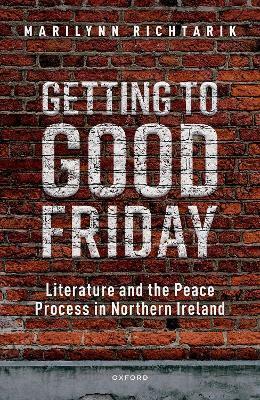Getting to Good Friday: Literature and the Peace Process in Northern Ireland

Getting to Good Friday: Literature and the Peace Process in Northern Ireland
Getting to Good Friday intertwines literary analysis and narrative history in an accessible account of the shifts in thinking and talking about Northern Ireland's divided society that brought thirty years of political violence to a close with the 1998 Belfast/Good Friday Agreement. Drawing on decades of reading, researching, and teaching Northern Irish literature and talking and corresponding with Northern Irish writers, Marilynn Richtarik describes literary reactions and contributions to the peace process during the fifteen years preceding the Agreement and in the immediate post-conflict era. Progress in this period hinged on negotiators' ability to revise the terms used to discuss the conflict. As poet Michael Longley commented in 1998, 'In its language the Good Friday Agreement depended on an almost poetic precision and suggestiveness to get its complicated message across.' Interpreting selected literary works by Brian Friel, Seamus Heaney, Michael Longley, Deirdre Madden,
Seamus Deane, Bernard MacLaverty, Colum McCann, and David Park within a detailed historical frame, Richtarik demonstrates the extent to which authors were motivated by a desire both to comment on and to intervene in unfolding political situations. Getting to Good Friday suggests that literature as literature-that is, in its formal properties in addition to anything it might have to 'say' about a given subject-can enrich readers' historical understanding. Through Richtarik's engaging narrative, creative writing emerges as both the medium of and a metaphor for the peace process itself.
PRP: 422.02 Lei
Acesta este Prețul Recomandat de Producător. Prețul de vânzare al produsului este afișat mai jos.
379.82Lei
379.82Lei
422.02 LeiIndisponibil
Descrierea produsului
Getting to Good Friday intertwines literary analysis and narrative history in an accessible account of the shifts in thinking and talking about Northern Ireland's divided society that brought thirty years of political violence to a close with the 1998 Belfast/Good Friday Agreement. Drawing on decades of reading, researching, and teaching Northern Irish literature and talking and corresponding with Northern Irish writers, Marilynn Richtarik describes literary reactions and contributions to the peace process during the fifteen years preceding the Agreement and in the immediate post-conflict era. Progress in this period hinged on negotiators' ability to revise the terms used to discuss the conflict. As poet Michael Longley commented in 1998, 'In its language the Good Friday Agreement depended on an almost poetic precision and suggestiveness to get its complicated message across.' Interpreting selected literary works by Brian Friel, Seamus Heaney, Michael Longley, Deirdre Madden,
Seamus Deane, Bernard MacLaverty, Colum McCann, and David Park within a detailed historical frame, Richtarik demonstrates the extent to which authors were motivated by a desire both to comment on and to intervene in unfolding political situations. Getting to Good Friday suggests that literature as literature-that is, in its formal properties in addition to anything it might have to 'say' about a given subject-can enrich readers' historical understanding. Through Richtarik's engaging narrative, creative writing emerges as both the medium of and a metaphor for the peace process itself.
Detaliile produsului













